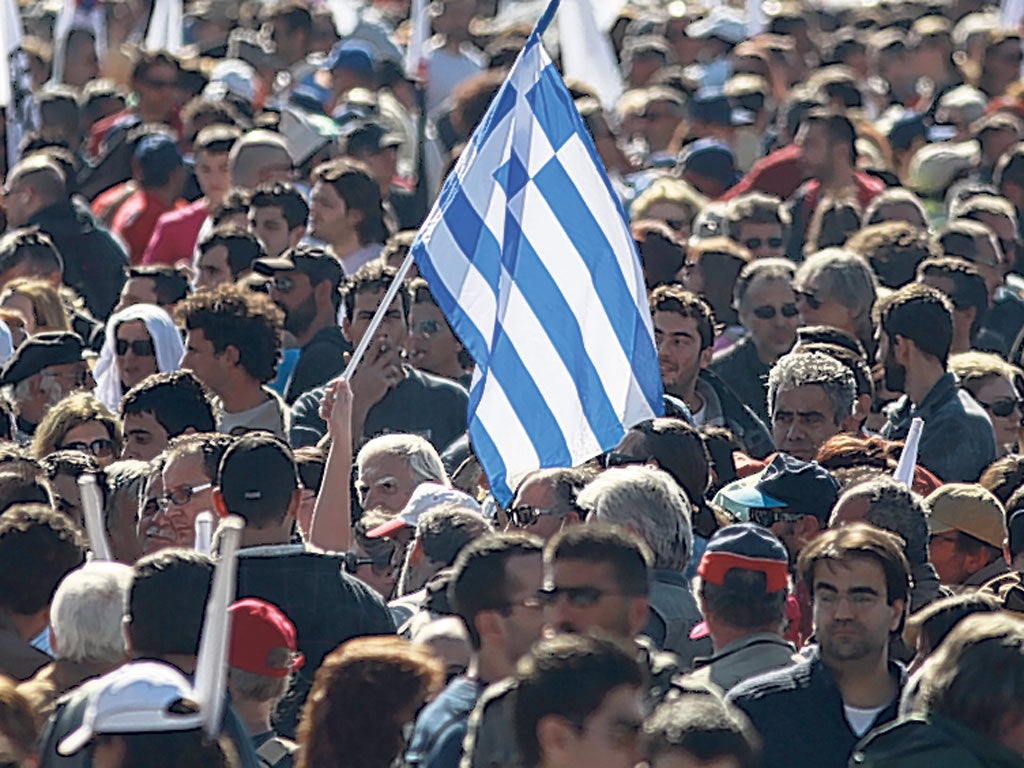Demonstrators: 'This violence is not about rage, it's about desperation'
Patrick Cockburn sees Greece's middle classes out in force on the streets of Athens as MPs vote on new austerity measures

Your support helps us to tell the story
From reproductive rights to climate change to Big Tech, The Independent is on the ground when the story is developing. Whether it's investigating the financials of Elon Musk's pro-Trump PAC or producing our latest documentary, 'The A Word', which shines a light on the American women fighting for reproductive rights, we know how important it is to parse out the facts from the messaging.
At such a critical moment in US history, we need reporters on the ground. Your donation allows us to keep sending journalists to speak to both sides of the story.
The Independent is trusted by Americans across the entire political spectrum. And unlike many other quality news outlets, we choose not to lock Americans out of our reporting and analysis with paywalls. We believe quality journalism should be available to everyone, paid for by those who can afford it.
Your support makes all the difference.Tens of thousands of demonstrators besieged the Greek parliament for a second day yesterday as MPs prepared to vote for pay cuts, tax increases, job losses and other changes demanded by international creditors in return for further loans to avert bankruptcy.
Eddies of tear gas drifted into streets around Syntagma Square in front of parliament where youths in hoods fought riot police and other demonstrators.
But the most notable feature of the largely peaceful rallies this week is that they are large and include large numbers of middle class professionals such as doctors, teachers and pharmacists as well manual workers like garbage collectors and dock workers.
"The reason you see this determination on the part of the demonstrators is the result not of rage but desperation," said Simos Kedikoglou, an MP from the opposition New Democracy party. "People simply can't make ends meet. We are talking about the death of the middle class in Greece."
This sense of desperation was confirmed by Elleni Kalouri, a demonstrator.
She is a 35-year-old school teacher specialising in mathematics and had seen her salary "cut from €1,200 a month to €900 and I can no longer afford to pay the rent on my apartment so I am staying with a friend. We are becoming poor and it is not fair."
Another demonstrator, wearing a white face mask against tear gas, was Vassilis Stathousis, the president of the rail workers union, who said he expected the bill to be passed by parliament though onlybarely. He said "privatisations are expected as the IMF traditionally takes all national property." The little-used but costly railway system is mentioned frequently as a prime candidate to be broken up and sold off.
The changes on which parliament is to vote envisage a new pay system for 700,000 civil servants, further cuts in public sector wages, cuts in pensions and the suspension of wage bargaining.
In addition, the tax free threshold is to be lowered from €8,000 to €5,000, and 30,000 public sector workers to be suspended will see their wages cut by 60 per cent and face lay-offs.
"You have to approve the law, with all its clauses," Finance Minister Evangelos Venizelos told parliament. "This is not a game. If anybody thinks they can test how much wiggle-room we've have, they're mistaken."
There were clashes at the end of the rallies yesterday, which were coordinated with a 48-hour general strike. The skirmishing in front of parliament was largely initiated by young men in black who are masked and claim to be anarchists, but protest leaders claim they are tolerated by the riot police in the belief that violence will discredit the demonstrations as a whole. Some 16 people were injured yesterday and one person died from a heart attack.
After the austerity package is implemented, public service workers will have seen their average income cut by 40percent over two years. Highly educated young Greeks see no prospects at home and small businesses are collapsing because of higher taxes and a steep fall in demand. Although the ruling Pasok party should be able to force through the new law because it has 154 out of 300 seats in the parliament, there are increasing demands for new elections.
Mr Kedikoglou said the government was enfeebled by its unpopularity - support for Pasok has fallen to 15 per cent - and its lack of legitimacy.
"The government is in a state of shock and does not know what to do except to agree to everything the [EU-IMF] Troika asks," he says. "It has no democratic legitimacy because it won the election in 2009 saying there was enough money for everybody."
Join our commenting forum
Join thought-provoking conversations, follow other Independent readers and see their replies
Comments